by Yucheng Tang
posted Dec. 2
“135?” someone calls out from in front of the blue trailer.
“Here,” says a man in a green jacket and blue jeans, who then takes charge of his freshly-packed laundry bag labelled “135.”
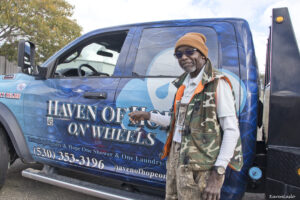
The man puts the bag in his arm and walks toward the shopping cart filled with his other belongings.
Suddenly, he lowers his head and leans toward the plastic bag, smelling his freshly washed and dried clothes as if he was smelling the fragrance of flowers. Then, he smiles, illuminated by warm sunlight.
He had taken a hot shower and received his laundered clothes at the truck-trailer “Haven of Hope on Wheels.” The Haven is a mobile hygiene unit that offers shower and laundry services to vulnerable individuals in need, most of whom are homeless.
The Haven of Hope’s website notes that without showers, clean clothes and general grooming, it’s difficult for people to seek housing assistance, employment, medical care and other services. “When they are dirty and don’t smell great, the homeless are usually shunned by society,” the website states.
The trailer is equipped with three rooms containing showers and toilets, as well as one laundry room featuring four washing machines and four dryers. A 500-gallon water tank provides the water needed. Towels and hygiene kits were being distributed on this recent Tuesday, including toothpaste and toothbrushes.
Earl Lewis, who oversees the trailer and on-site operations, told ChicoSol that the program usually serves 20 to 30 people in need of showers and completes about 15 loads of laundry on service days.
The program started in Oroville in 2016, but now has five trailers, and after the 2018 Camp Fire, expanded services to nearby foothill towns like Concow and Berry Creek. It will service other communities interested in contracting with Haven of Hope on Wheels.
A 2016 coincidence
One night in 2016, Kevin Thompson, an Oroville pastor who is CEO of Southside Oroville Community Center, was out having his team lock up the Riverbend Park in Oroville, when he saw a woman climbing up an embankment and trying to get out of the park. Later, he stopped by Walmart to pick up something his wife had ordered. When he got to the cash register, he found the cashier was the woman who had apparently slept in the park.
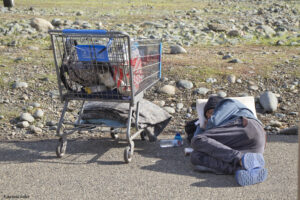
“She was going to work every day,” Thompson noted. “She wasn’t high; she wasn’t loaded. She just didn’t have adequate housing.”
He thought, “We need to give this lady an opportunity to get clean, get her clothes clean, so she can continue to go to work.”
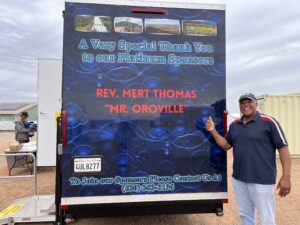
Thompson and his wife, Deborah, launched Haven of Hope on Wheels. The program has been funded mainly by donors, and Thompson said the City of Oroville donated $175,000 one time around four years ago. The county has provided some grant funding, but “those grants pretty much dried up,” Thompson said.
The Southside Community Improvement Association oversees the program.
Lisa Torres, facility administrator for the Southside Oroville Community Center, recalled their first client back in 2016.
“When she came, she was homeless, she wasn’t too cleaned up,” Torres said of the young woman. “She went in there, took a shower, and you could just see the difference in her face -– she got really happy. She was able to have hope, be able to go out there and feel clean.”
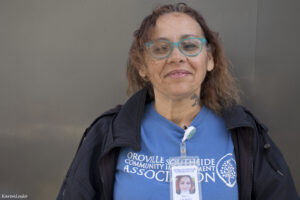
The power of that contrast remains with Torres. When she mentioned it to ChicoSol, tears rolled down her cheek. “It’s a trailer that brings hope to those people.”
In Oroville, the trailer operates in the space in front of the Hope Center, where unhoused people can get free food and clothes, every Tuesday and Friday.
New clients at the mobile hygiene unit fill out a form and that information is recorded so that someone can reach out with potential housing opportunities. Haven of Hope says it provides access to community resources including job training.
“I hate turning anyone down”
Lewis, 75, hopping on and off the trailer, helps clients check in and drop off laundry. He wears an orange-lined vest.
Lewis said that fewer people come on the 1st and 15th of the month, because, “that’s the day they got their check.”
“They will head to the motel for the night as soon as they get money,” Lewis said. However, any government benefits they receive “are usually too low for them to maintain this life.”
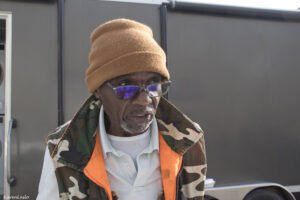
Each person is supposed to take a shower no longer than 10 minutes, but Lewis often lets clients take a little longer and tends to give women a bit more time.
Daily tasks that seem easy can be challenging for those facing hardship. Many of the Haven of Hope clients struggle with mental health issues or sobriety.
The day this reporter visited, a woman arrived late, nervous about whether she could still get the shower and laundry done. Lewis told her that the laundry time had passed. She said nervously, pleading, “Can I just use the dryer? [My clothes] are already washed.” Lewis agreed.
After a heavy rain on a recent Friday, some people came late, desiring a hot shower, and Lewis extended the service hours for them.
“I hate turning anyone down,” Lewis said. “Some of them have been without a shower for months. We can go back home and take a shower as long as we want — without time limits. But they cannot.”
Lewis said that when he sees a homeless person who has an upcoming job interview take a shower and prepare with clean clothes, he sees the value in what he does.
Keeping warm: a lighter in a sleeping bag
Kevin MacDonald, who lost his home during the Camp Fire, now lives in a Paradise mobile home but showed up for Haven of Hope this November day.
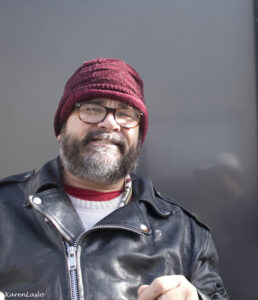
“Every morning I get up and I’m thinking the table that melted to the ground is underneath me,” MacDonald said. “Everything melted. Everything. My wife’s Dutch oven was the only thing that was there that survived the whole fire.”
MacDonald said he could have showered at home, but Haven of Hope on Wheels can help him save on his energy bill, which is “so expensive.”
For a moment, he looked relaxed and happy after getting out of the shower, shaking his head in the air to fling off the water. Then he seemed to turn sad while sharing his story.
When the Camp Fire exploded, smoke and fire engulfed his house. “After the fire, my wife and I lost everything, and last April, I lost my wife in a car accident,” MacDonald said.
He said the fire left him struggling with mental health issues, and his wife’s death worsened his condition. “My brain just doesn’t function,” MacDonald said.
He has been through four counselors, and no one can “get to my mind to see what’s wrong with me.” Now, he seeks food from different churches, sleeps most of the time, and seldom goes out.
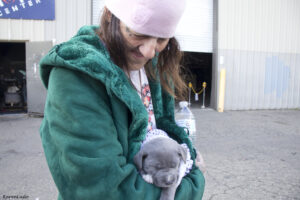
Charles Martinez, 63, said he got laid off from a hospital during Covid-19. “When I went back to the workplace after recovering from Covid, they already filled the position with someone new and then fired me,” he explained.
He has lived in his truck since then. On these cold nights, he and his dog huddle together to stay warm. “You know why so many of us have dogs?” he asked. “Because we use them for heat.”
Dogs accompanied many homeless people at the site, most of them kept on leashes.
Martinez now volunteers in the trailer, helping with cleaning.
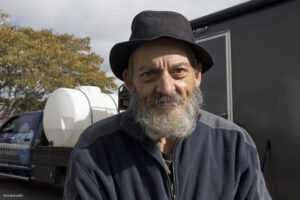
Martinez regards the volunteer work in the trailer as his job. “I am old,” Martinez said, commenting on the obstacles he faces in finding paid work. “Even young people are going through unemployment now.”
He said homeless people are treated differently than the housed. “I bet if you dress like me, go to a restaurant and ask to use the bathroom, they will kick you out,” he said.
Some of the Haven clients have found a glimmer of hope and optimism.
John Churchill, 40, said he got laid off in October. He has been living in a tent since then.
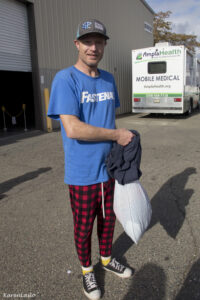
“It has been extremely cold sleeping in the tent,” Churchill said. His sleeping bags became wet after several days of rain.
One night, he ignited a lighter inside his sleeping bag to heat it. He only managed to get four hours of sleep that came in the morning. It was when the sun came up and the temperature warmed slightly that he was able to sleep.
The job application process has been slow, but having completed court probation, he plans to apply for truck-driving jobs.
“I can get a bed inside the truck that I can use, and at the truck stops I can get showers that I can use,” he said. “I’m no longer on probation and nothing’s holding me back now.”
Yucheng Tang is a California Local News Fellow reporting for ChicoSol.
This story was corrected Dec. 10 when we learned that “MacDonald” had been misspelled. ChicoSol has also deleted an earlier reference to Las Vegas.

Very impressive Tang
A shower is so important! This is a great program that helped inspire North State Shelter Team’s award winning Solar Charged Mobile Showers program. Thank you guys so much! Less despair makes our streets safer.
Thank you Charles
Working together makes or community better, keep up the great work..
pastor Kevin Thompson
OSCIA
Outstanding article, Yucheng. Good job on personalizing this assistance that homeless people folks need so badly. I wish Chico could do something like this.
I’m Kevin MacDonald There was an article just released today with my picture yet my name was spelled wrong and what was reported in the paper was incorrect I do believe when speaking of an actual person the facts should be correct I was in Paradise when the Campfire happened not in Las Vegas to down play me emotions should be a crime so I would like to know what you are doing to fix this.
Kevin MacDonald: We have corrected the spelling of your name and deleted the reference to Las Vegas. We strive for clear and honest reporting, regret any error(s), and clarify to the extent we can with our sources.
Thank you for your time much appreciated.